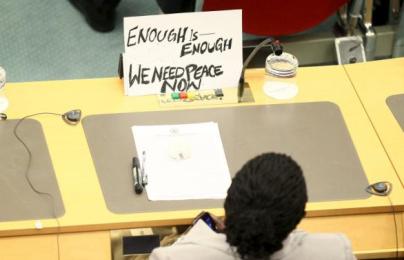Nations urge South Sudan president to sign peace agreement
August 18, 2015 (WASHINGTON) – Powerful world nations and the United Nations have expressed disappointment over refusal by the South Sudanese president, Salva Kiir, to sign a final peace agreement with the former vice president, Riek Machar, urging him to also sign the deal or face the consequences.

“The United States deeply regrets that the government of South Sudan chose not to sign an agreement that was supported by all of the states in the IGAD plus, the troika – the United States, United Kingdom and Norway, China, the African Union and the United Nations today,” said spokesman of the US State Department, John Kirby, in a statement issued on Tuesday.
“We call on the government to sign the agreement within the 15-day period it requested for consultations,” it urged.
President Kiir stormed out of the venue on Monday, refusing to sign the peace agreement and later on only accepted to initial it as a witness. He asked for 15 days to consult again with his officials in Juba despite earlier previous consultations granted to him on the same proposal.
US said the document which the former vice president, Machar, signed on 17 August must also be signed by the South Sudanese president Kiir within the timeframe he requested from IGAD Plus mediation, warning of severe consequences should he refuse to sign it.
“As the president [Barack Obama] has stated, if there was no agreement signed today, we would consider ways to raise the cost for intransigence,” Kirby said, adding we would “work with our regional and international partners on next steps and on ways to increase pressure, especially against those that are undermining the peace process or opposing this agreement.”
From London, Tobias Ellwood, member of the British parliament, who represented his government on Monday called on the South Sudanese leader to sign the IGAD Plus proposed peace agreement and for all parties to implement it.
Speaking following the summit hosted by the Intergovernmental Authority on Development (IGAD) in Addis Ababa, he hailed the rebel leader, Machar, for signing the deal in commitment to end the war.
“I welcome the progress made at the summit on South Sudan on 17 August, with the signature of a peace agreement by the opposition and other South Sudanese parties,” Ellwood said.
“But I am deeply disappointed that the Government of South Sudan has not yet signed. I strongly urge them to do so immediately and call on all parties to commit fully to implementing the agreement,” he added.
He said after 20 months of fighting, and with 2 million displaced from their homes, further delay beyond the 17 August deadline was “completely unacceptable.”
“The UK and its troika partners, the US and Norway, stands by the people of South Sudan and calls on the Government to make peace a reality. We will consult with our regional and international partners on the immediate next steps,” he added.
In Berlin, German Federal Foreign minister, Frank-Walter Steinmeier, also announced that his government would join in taking action against a party that refused to sign the peace agreement, saying the parties had already negotiated the deal to stop what he said was the bloodbath in the country.
“The fact that an agreement could be negotiated shows that both parties are basically willing to settle the conflict. Therefore it is very important now, that President Kiir and his government officially accept the outcome of the negotiations and sign the peace agreement,” German minister of foreign affairs said on Tuesday.
“Reports that the South Sudanese government is taking oppressive action against people and institutions committed to peace causes great concern to me. Germany supports the international community in considering further measures and sanctions against those who sabotage the peace process,” he said.
Earlier, the regional and international actors including the world body, the United Nations warned of tough measures against any party that would refuse to sign the final peace agreement on 17 August deadline, which would include arms embargo, assets freeze and travel ban.
Analysts say such actors may be working on the next steps behind the scene should president Kiir fail to sign the agreement within 15 days granted to him and his government.
On Monday, Pagan Amum, the recently reinstated secretary general of the ruling party (SPLM) in South Sudan also signed the peace deal on behalf of former detainees, despite his chairman’s observations to the deal.
A representative of all opposition political parties in South Sudan was also supposed to sign the deal, but was absent due to travel restrictions imposed by the government resulting to their failure to show up at the venue of the talks in the Ethiopian capital.
Leader of the main opposition group, Lam Akol of SPLM-DC, who represented political parties at the talks in the past was prevented from travelling to Addis Ababa at Juba airport by security operatives. Another pro-government senior official of the opposition parties, Martin Elia Lomoro, who is also cabinet minister, and was allowed to travel to Addis Ababa to represent the parties, was however deported by the Ethiopian authorities.
President Kiir and representative of the political parties are expected to sign the peace deal within 15 days.
Observers however said the South Sudanese president was facing threats from army generals who had been against a peace deal, hoping to score military victory instead, coupled with alleged influence from the Ugandan president Yoweri Museveni who seems to be holding the key to some of the decisions in the leadership of South Sudan.
Fighting erupted on 15 December 2013 when president Kiir accused his former deputy, Machar, of allegedly planning a coup against him. Machar dismissed the accusations saying the president wanted to use the allegation against his opponents who were calling for political reforms in the country.
(ST)
